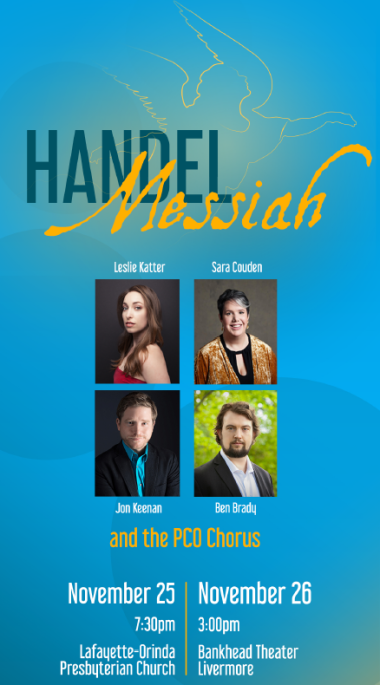
- (Livermore/Lafayette) Pacific Chamber Orchestra and Conductor Lawrence Kohl ushers in the holiday season with the sublime melodies, uplifting messages and sheer beauty of George Frideric Handel’s beloved Messiah Saturday November 25th 7:30 pm at the Lafayette-Orinda Presbyterian Church and Sunday November 26th 3:00 pm at Livermore’s Bankhead Theater. PCO features the soaring, rich vocal tones and commanding stage presences of soprano Leslie Katter, contra alto Sara Couden, tenor Jon Lee Kennan and bass-baritone Ben Brady, along with the Pacific Chamber Orchestra’s thunderous 50-member chorus. Tickets may be purchased for either performance on-line at PacificChamberOrchestra.org
“Triumphant” Soprano Leslie Katter’s “clear, sweet tones” (Opera Tattler) are well known to Bay Area audiences through a wide range of singing styles from new works in West Edge Opera to Gilbert and Sullivan delightful Lamplighter operettas. Praised for her "unusually rich and resonant voice" (Opera News), contralto Sara Couden debuted with the Metropolitan Opera in 2022 and is a premiere interpreter of operatic, concert, and song repertoire. Los Angeles based Tenor, Jon Lee Kennan, is devoted to new music and is a master Baroque stylist. He displays “clear, sweet high tones” (LA Times) and a “commanding narrative style” (SF Classical Voice). Bass-Baritone Ben Brady’s cavernous, faultless low notes, brings robust life…” (SF Gate). Ben made his debut with the prestigious Santa Fe Opera this past summer.
Maestro Kohl uses Handel’s original instrumentation and has sculpted a gripping presentation of all of Part I with significant sections of Parts II and III to include the delightful numbers such as “All we like sheep have gone astray” and resounding numbers like “The trumpet shall Sound.” Another delight is that Kohl has the four soloist sing together(!) as a solo quartet “Their sound has gone out.” As a conclusion of PCO’s Messiah performance, the audience is invited to join the Chorus and soloists to sing the hallelujahs in a reprise of the famed number filling all with joy for the coming holidays. Messiah has been continuously performed for 280 years because, according to the critic Matthew Arnold (1822 – 1888), “it speaks to what is permanent in the human soul.
Background Notes:
George Frideric Handel (1685 – 1759) wrote Messiah in 1741 in just 24 days. He famously said, “Whether I was in the body or out of my body when I wrote it I know not.” For his text, he followed the libretto (or lyrics) collated by Charles Jennings, said to contain “profound thematic coherence and elevated musical structure.”
Handel took a huge risk creating an English “oratorio” as his salvation from penury. He came to write English oratorios because the three commercial Italian opera companies he had begun in 1719 began to fail. They were designed to serve the London aristocracy who favored his operas. While there are no props, elaborate costumes or stage action between the characters, oratorios are dramatic in their style. These were perfect for the English middle class, and with the lower cost, were quite affordable.
By 1737, Handel suffered a traumatic physical breakdown (a stroke) which radically changed his creative direction from operas to oratorios. His oratorios were tailor made for the English middle class. He never wrote another Italian opera. An oratorio is defined as a large-scale musical work for orchestra and voices, usually in the form of a narrative with a religious theme.
The Messiah debuted in April, 1742 in Dublin, Ireland as the English clergy thought it not religious enough, as there is no role for one to be the Messiah, while the theaters felt it was too religious for their stages. The Irish Bishop acquiesced to an Irish premier on the condition that proceeds would go to the Foundling Hospital. To build an audience for his new work, Handel had the soloists and chorus members go out into the town squares and “spontaneously” sing numbers – the origin of the ever popular flash mob.
After the Dublin success, it came to England where it is said that during the “Hallelujah Chorus” performance, King George II, upon hearing “King of Kings”, rose to his feet – thus obliging the audience to do the same and beginning a tradition that is still observed by many.
Tickets may be purchased for either the November 25th 7:30 pm Lafayette or the Sunday 3:00 pm Livermore performance on-line at PacificChamberOrchestra.org Tickets may also be purchased for the Livermore performance through the Bankhead box office by phone at (925) 373-6800, or by visiting the box office at 2400 First Street Wednesday – Sunday from noon to 6 pm.
About the Pacific Chamber Orchestra
Pacific Chamber Orchestra (PCO) is dedicated to sustaining and extending the rich heritage of classical music for chamber orchestra through inspiring performances and engaging educational programs designed to enrich local communities. This premier regional ensemble, comprised of eight to 42 experienced professional musicians, blends the intimate clarity of chamber music with symphonic power to create an enticing palate of tonal textures. Maestro Kohl’s programs include a versatile repertoire ranging from Baroque to classical to more contemporary, uniquely designed to illuminate connecting threads of works performed. Beyond the concert hall, PCO serves thousands of students through educational outreach programs. Now in its 35th season, PCO’s tag line “Artistry Passionately Shared” reflects our dual commitment to artistic integrity and community engagement.
